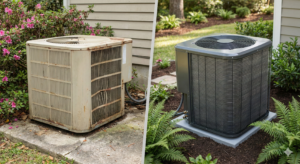Trying to keep every room in your house at the perfect temperature can be a challenge, especially when one space always feels too warm while another stays too cold. Whether you’re running the AC during Summerville’s hot summers or using the heat during those cooler evenings, the struggle for consistent indoor comfort is real. That’s where an HVAC zone control system comes in. It offers a smarter way to manage temperatures in different parts of your home without overworking your system.
This type of setup gives more control over how each area feels, which can lead to better comfort and fewer arguments over the thermostat. Instead of treating the entire home as one big space, zoning splits it into smaller sections so you can manage each one more precisely. This kind of flexibility is especially helpful in larger homes or in spaces that get uneven sunlight, like a sunroom that heats up faster than a shaded bedroom.
What Is an HVAC Zone Control System?
An HVAC zone control system is a setup that divides your home into multiple temperature-controlled areas, or zones. Each zone has its own thermostat and temperature settings, allowing one part of the home to be cooler or warmer than the others. All zones are connected and managed through one central control panel.
So, how does it all work? The system includes three main components:
1. Thermostats: Each zone has an individual thermostat so the temperature can be adjusted separately.
2. Dampers: These are placed inside your air ducts. They open or close based on thermostat settings to control airflow to different areas.
3. Control Panel: This is the system’s hub. It receives input from all the thermostats and tells the dampers when and where to open or close.
Rather than forcing your entire home to one temperature, the system sends hot or cold air only to rooms where it’s needed. For instance, your upstairs bedroom might stay warmer than your downstairs living room. With a zone control system, you can cool the bedroom without chilling the rest of the house.
This setup is especially practical for multi-story homes, converted basements, large open floor plans, or rooms with different insulation levels and sun exposure.
Benefits of HVAC Zone Control Systems
Installing an HVAC zone control system can improve comfort and lower your energy use significantly. When every room gets just the right amount of heating or cooling, your system doesn’t have to run as long or as often to meet your household needs.
Here are some key benefits zoning brings:
1. Better comfort: A single thermostat can’t keep every room in your house comfortable at the same time. With zoning, you get targeted temperature control in each area. No more freezing in one room while sweating in another.
2. More efficiency: Your HVAC system no longer pumps air into empty or rarely used rooms. It works only where you want it to, which means less energy is wasted.
3. Longer system lifespan: By reducing the overall workload on your HVAC system, zoning helps lower wear over time. The less your system struggles to meet demand, the longer it’s likely to last.
Zoning also helps resolve disagreements over the thermostat. One person’s comfort level might make another person uncomfortable. With zones, everyone can have their preferred settings depending on where they are in the house.
Installing an HVAC Zone Control System
The process of getting a zone control system involves several steps and a fair bit of technical know-how. For most households, it’s not something to take on alone. Hiring an experienced HVAC company in Summerville is your safest move.
Here’s what goes into a typical installation:
1. Evaluate your current system and home layout.
2. Decide where zones should be located.
3. Install thermostats in each zone.
4. Add dampers inside the ductwork.
5. Sync everything to a central control panel.
A skilled technician will also make sure the ductwork is balanced and properly sealed. This ensures your HVAC runs smoothly once all the new equipment is in place.
While DIY videos might make zoning look simple, the truth is that poor installation leads to air leaks, uneven temperatures, and wasted energy. Professionals have the tools and training to make sure the setup works perfectly from day one. That’s especially important in a humid and warm area like Summerville, where comfort depends on precision.
Is an HVAC Zone Control System Right for Your Home?
While zoning isn’t a must for every household, it works better in some homes than others. Multi-level homes usually benefit the most. That’s because warm air naturally rises, causing upstairs areas to be hotter than downstairs ones. A zoning system solves this imbalance without overcompensating or overusing the HVAC unit.
Zoning may also be right for your home if you have:
– Large open spaces
– Rooms with high ceilings
– Additions or sunrooms
– Rooms with lots of windows
– People who have different comfort preferences
If your HVAC system is fairly new and in good shape, adding a zone control system can give it better performance without needing a full upgrade. However, if your current system is outdated or struggling already, your HVAC contractor may recommend replacing the system before upgrading.
You’ll also want to think about how often you use each space. If you spend little time in guest rooms or bonus rooms, there’s no point in conditioning them the same as your main living areas.
Making the Most of Your HVAC System in Summerville
Once your zoning system is in place, knowing how to take care of it helps you get the most out of your investment. Routine checkups and minor efforts go a long way in maintaining long-term performance.
Here are a few tips for keeping your system working strong:
1. Clean or replace air filters regularly.
2. Schedule seasonal tune-ups, especially before summer and winter.
3. Keep vents clear and unblocked to allow easy airflow.
4. Monitor your thermostats and schedules to avoid big energy swings.
Since Summerville experiences hot, humid summers and mild winters, it’s smart to prep your system before the heat kicks in. Having your HVAC tuned and inspected in spring means fewer surprises during the hottest months.
Don’t ignore small issues either. Strange sounds, inconsistent temperatures, or odd smells can all be signs that something’s off. Catching problems early prevents bigger issues later.
Also, talk with your HVAC technician about zoning schedules. Some thermostats allow you to set different temperatures at different times of day. That’s helpful if some rooms are only used at certain hours, like a home office or playroom.
The Way to Comfort and Efficiency
Your home should keep up with your lifestyle, not the other way around. An HVAC zone control system makes it possible to enjoy personalized comfort while using less energy. It’s about staying cooler in the summer, warmer in the winter, and doing both without driving up your utility bills.
From smoother airflow and balanced temperatures to keeping everyone in the family happy over thermostat settings, zoning gives you more control over how your space feels every day. It also helps your HVAC system last longer by preventing it from running more than it needs to, season after season.
If you’re tired of hot spots, cold zones, or arguments over thermostat settings, it might be time to explore what zoning can do for your home. Especially here in Summerville, where quick weather changes can create sudden indoor discomfort, a zone control system helps make your home feel comfortable all year long.
Whether you’re looking to fine-tune your current system or planning a new installation, an HVAC zone control system could be the key to better comfort in your home. To learn more about how your setup can work more efficiently, explore your options for HVAC in Summerville with Coastal Carolina Comfort and get tailored solutions built for year-round performance.


